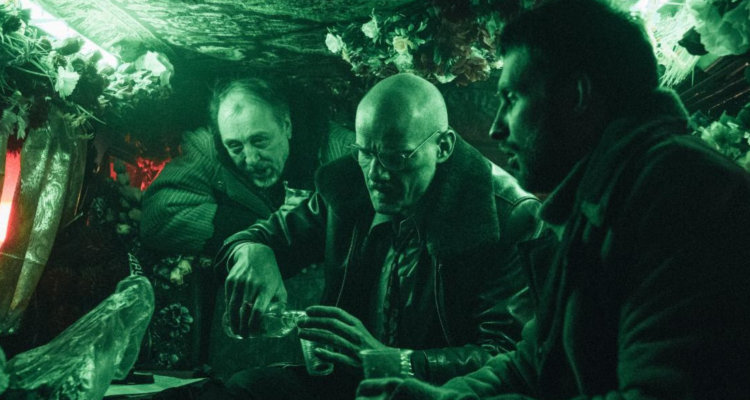It’s a good thing you can’t catch a virus from an image because if you could, just a few frames of Kirill Serebrennikov‘s fabulously yeasty, bilious, dank Competition title, “Petrov’s Flu” would bring all of Cannes‘ anti-Covid measures to naught. A feverish delirium of a film that rollicks through an apocalyptically bleak Yekaterinburg New Years’ Eve as though strapped to an out-of-control hospital gurney, its long takes go on for little eternities, as Serebrennikov weaves queasily into diseased reality and out of splintered memory, colliding bravura filmmaking with theatrical staging and an almost old-fashioned literary vibe. Reeling past the arrayed faces of Tolstovian classicism, down the sweating corridors of modernism, out into dark dystopian night of a graphic novel (Petrov is a comic book artist moonlighting as a mechanic, or vice-versa), the cinema of this-is-confusing-and-repellent-and-I-think-I-love-it has found its “Ulysses,” and it is hunched over with a hacking cough on a grimy bus to nowhere.
READ MORE: Cannes Film Festival 2021 Preview: 25 Films To Watch
Petrov (a terrifically physical Semyon Serzin) jaundiced and hollow-cheeked with a demeanor of reluctance, like he’s being dragged around by the nose by fate, is the man in question, crammed elbow to elbow with all the other Edvard Munch-character grotesques on this Boschian bus. Around him, people grumble and haggle – this is a world of little tenderness in which even the most benign act, such as offering your seat to someone on public transport, can lead to a bitter, racist harangue. The jalopy lurches to a standstill, and Petrov is brought off it by men waving badges of some sort, whereupon he’s jostled up a slushy, muddy alley where a gun is put in his hand, making him part of a firing squad, who must execute a bunch of well-dressed, fatcattish strangers.
READ MORE: Summer 2021 Preview: Over 50 Movies To Watch
The moment is shocking, the more so because this is before we’ve properly understood that Serebrennikov is, not to put too fine a point on it, fucking with us. Throughout the film, whether it’s sudden (quite sexy) sex scenes or Petrov’s librarian wife (Chulpan Khamatova) morphing into a black-eyed, death-dealing superhero, or Petrov assisting in the suicide of a young writer who may or may not be Petrov himself or the memory of a certain childhood New Year celebration complete with actors costumed as the Snow Maiden and Father Frost, Serebrennikov will never clue us to the moment that reality gives way to flu-induced hallucination. The joins between the actual and the imagined are invisible, and the borders between waking, dreaming, and remembering states are entirely porous.
READ MORE: The 100 Most Anticipated Films Of 2021
But if that implies some faffy oneiric mood, some slippery ethereal atmosphere, be not misled: “Petrov’s Flu” is fascinating partly because of the chunky muscularity – the inherent masculine brawniness – of Serebrennikov’s filmmaking, in which dreams are as solid and hard-edged as reality, and reality is a blockish, jostling thing. You end up disoriented and unsure of which way is up, but each step you took led directly from the one before: this is a strictly linear account of a journey through a labyrinth. When motifs recur, it’s not like they float up out of the ether, either. Instead, they are as prosaic as they are inexplicable – a pattern on a sweater; a strand of cheap tinsel; expired aspirin pills; a corpse that is not dead, or if it is, it might not be forever.
READ MORE: The 25 Best Films Of 2020 You Didn’t See
Just when you think you’re getting to grips with it all, Serebrennikov pivots again, delivering a suddenly monochrome extended sequence following the young Snow Maiden as she gets some distressing news. It could almost be a separate film were it not for the way it ties back to the main story at the last moment, with an uncanny, “La Jetee“-style shift in perspective that is perfect and also perfectly perplexing.
Serebrennikov originally developed this work for theater, though it is adapted from the novel “The Petrovs In and Around the Flu,” which you will absolutely feel like you have read, cover to cover, by the time the movie ends. Perhaps that stage provenance is one reason for the mechanical, in-camera practical effects and those astonishingly physical long takes that leave you subconsciously wheezy and short of breath, gasping for the relief of a cut that never comes. But though it sometimes feels densely literary, like it’s a 19th-century bildungsroman written from the point of view of a consumptive, and sometimes it’s archly theatrical, “Petrov’s Flu” is mainly a work of pure, gross, mindboggling cinema, a 146-minute exercise in sustained lunacy, irony and catastrophist thinking that no amount of Nyquil can soothe. [B+/A-]
Follow along with our full coverage from the 2021 Cannes Film Festival here.

